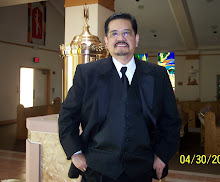The Catholic Church does not have a leader today. Pope Benedict XVI resigned and his last day as Pope was on Feb. 28th.
How does an organization exist without a head?
If the church were an ordinary organization or corporate entity, it would have been simple. There would be a temporary or interim chair or officer or sometimes, a collective body, assigned to cover his work.
But a massive organization like the Catholic church, a church of more than 1 billion members, with a mission to strengthen the Church built by Jesus Christ, cannot simply be assigned an ordinary or interim leader.
The impact of Pope Benedict's XVI resignation is like a thunder roaring in the four corners of the world, and would continue to clap even when he and the generation of the year he resigned would be long gone. It is a historical event, not only in the Catholic annals but in the records of modern civilization.
I thought about this resignation. I read about Pope Benedict's reason for doing so, and I read about conspiracy theories, about various analyst's commentaries regarding this event.
And I found myself saying, "Pope Benedict, true to his academic-like tenure as Pope, having been regarded guardian and enforcer of conservative church doctrines, resigned because he believed that a Pope is not infallible, the Pope is just an ordinary human with human limitations, like getting weak as one gets older. So he resigned and showed the world that the papacy, while it is divinely-inspired, is also a human endeavor, and like any human task or assignment, can be faulted, can be erroneous, can be subject to stress and pressures, and yes, it can be departed from, and re-assigned to someone else."
All the talk about the ex-Pope being pressured by a larger, unseen, organized force within the Catholic church will just remain a conspiracy theory.
And although Pope Emeritus Benedict alluded to rivalry and individualism within the inner conclave of the Church and his advisers, the fact still remains that there are no direct public pronouncements regarding this.
Looking at it objectively, Pope Benedict left a legacy of strength and courage. For when faced with fragility of health and mind, and of doubt ("There were moments of joy and light but also
moments that were not easy ... there were moments, as there were
throughout the history of the Church, when the seas were rough and the
wind blew against us and it seemed that the Lord was sleeping"), he chose the courageous act of resigning in order to give the Church a new start, a new leader who, he felt, could face better the daunting challenges of a new world ("However, in today’s world, subject to so many rapid changes and shaken by questions of deep relevance for the life of faith..")
His resignation has changed the Catholic church forever; it will become a precedent for future Popes. It will become an option for future popes who could not perform or who would perform below par. It would make the Catholic Church act more swiftly in terms of crises, and problems besetting it.
I think it was Pope Benedict's greatest contribution to the church.
By his resignation, he brought the Catholic church closer to the modern world which he found complex, by showing that like a man-made entity, the Catholic Church which was built by the human son of God, can be re-shaped for it to be better and more responsive and stronger.
Here's the full text of Pope Benedict's resignation letter, as presented on the Vatican web site:
Dear Brothers,
I have convoked you to this Consistory, not only for the
three canonizations, but also to communicate to you a decision of great
importance for the life of the Church. After having repeatedly examined
my conscience before God, I have come to the certainty that my
strengths, due to an advanced age, are no longer suited to an adequate
exercise of the Petrine ministry. I am well aware that
this ministry, due to its essential spiritual nature, must be carried
out not only with words and deeds, but no less with prayer and
suffering. However, in today’s world, subject to so many rapid changes
and shaken by questions of deep relevance for the life of faith, in
order to govern the barque of Saint Peter and proclaim the Gospel, both
strength of mind and body are necessary, strength which in the last few
months, has deteriorated in me to the extent that I have had to
recognize my incapacity to adequately fulfill the ministry entrusted to
me. For this reason, and well aware of the seriousness of this act, with
full freedom I declare that I renounce the ministry of Bishop of Rome,
Successor of Saint Peter, entrusted to me by the Cardinals on 19 April
2005, in such a way, that as from 28 February 2013, at 20:00 hours, the
See of Rome, the See of Saint Peter, will be vacant and a Conclave to
elect the new Supreme Pontiff will have to be convoked by those whose
competence it is.
Dear Brothers, I thank you most sincerely for all the love
and work with which you have supported me in my ministry and I ask
pardon for all my defects. And now, let us entrust the Holy Church to
the care of Our Supreme Pastor, Our Lord Jesus Christ, and implore his
holy Mother Mary, so that she may assist the Cardinal Fathers with her
maternal solicitude, in electing a new Supreme Pontiff. With regard to
myself, I wish to also devotedly serve the Holy Church of God in the
future through a life dedicated to prayer.
From the Vatican, 10 February 2013
February 9, 2017 – MK 7:24-30
9 years ago







1 comment:
This is a very enlightening analysis of Pope Benedict's resignation.
Post a Comment